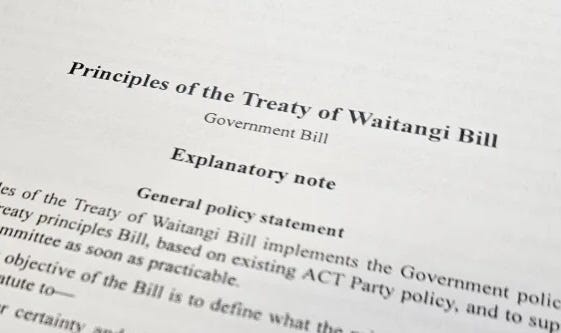Dear Select Committee,
The Treaty Principles Bill represents a crucial opportunity for New Zealand to affirm its commitment to the foundational values of equality, justice, and dignity for all. By enshrining universal human rights into law, the Bill strengthens the constitutional framework of the nation, fostering an environment where all individuals are treated with fairness and respect. This submission outlines the constitutional benefits of the Bill, addresses criticisms, and underscores its role in honoring the mana of the rangatira who signed Te Tiriti o Waitangi.
CONSTITUTIONAL BENEFITS OF ENSHRINING UNIVERSAL HUMAN RIGHTS
Enshrining universal human rights into law provides a robust foundation for protecting equality before the law. It guarantees that every individual, regardless of background, is entitled to fair treatment under the legal system. By codifying these principles, the Bill mitigates ambiguities that have historically fueled misunderstandings and legal disputes. The Treaty Principles Bill is a decisive step toward aligning New Zealand’s laws with its values, ensuring that justice is not only promised but delivered.
EQUALITY BEFORE THE LAW
The principle of equality before the law is a cornerstone of any just society. The Treaty Principles Bill reaffirms this ideal by seeking to address disparities that have persisted in the application of rights and responsibilities. By fostering a legal environment where all citizens are subject to the same standards, the Bill strengthens national unity and trust in the legal system. It provides a platform for addressing historical injustices while ensuring that future generations inherit a society that prioritizes fairness and equity.
HONORING THE RANGATIRA AND RESTORING DIGNITY
The Bill also serves as a means of honoring and restoring the dignity of the rangatira who signed the Treaty. Their decision to cede authority to the Crown was an act of profound significance, reflecting their desire to ensure peace and prosperity for their people within a new constitutional framework. To suggest that the Treaty unequivocally established a partnership rather than union oversimplifies the complex realities of the time. Recognizing the nuances of this history and engaging in a national discussion about these interpretations is essential for a balanced understanding.
The perspectives of leaders such as Sir Āpirana Ngata illuminate the depth of understanding held by many rangatira regarding the Treaty. As Ngata wrote,
“The Chiefs assembled … hereby cede absolutely to the Queen of England for ever the government of all of their lands.”
This acknowledgment of Crown sovereignty does not diminish the mana of those who signed the Treaty but rather highlights their vision and leadership in navigating the challenges of their era.
ADDRESSING CRITICISMS OF THE BILL
Critics of the Treaty Principles Bill often frame their opposition around concerns of sovereignty and interpretation. Some argue that the Treaty established a partnership between parallel sovereignties, while others view it as a union bringing Māori under the Crown. Both perspectives merit consideration, but too often criticism of the bill dismissing the viewpoint of the treaty establishing a one nation entirely disenfranchises the mana of the rangatira who understood and accepted the union.
The ambiguity surrounding the Treaty’s principles stems largely from legislative gaps, such as those in the 1975 legislation establishing the Waitangi Tribunal. These gaps have allowed judicial activism to reshape public perceptions of the Treaty’s intent. The Bill provides an opportunity to clarify these principles through a democratic process, fostering transparency and public engagement.
THE IMPORTANCE OF NATIONAL DISCUSSION
Engaging the voting public in discussions about the Treaty’s principles is not only appropriate but necessary. As the Treaty holds foundational importance for New Zealand, its interpretation should reflect the collective will of the people. A referendum, as has been suggested in the context of this Bill, is a legitimate tool for gauging public sentiment and ensuring that legislative decisions align with national values.
CONCLUSION
The Treaty Principles Bill is a significant step toward strengthening New Zealand’s constitutional framework and fostering a society grounded in equality and justice. By addressing historical ambiguities and engaging the public in meaningful discussions, the Bill honors the legacy of the rangatira and affirms the nation’s commitment to universal human rights. As Sir Āpirana Ngata aptly observed, “The Treaty made the one law for the Māori and Pākehā.” This Bill is an opportunity to build on that foundation, ensuring a future where all New Zealanders stand united under principles of fairness and respect.
